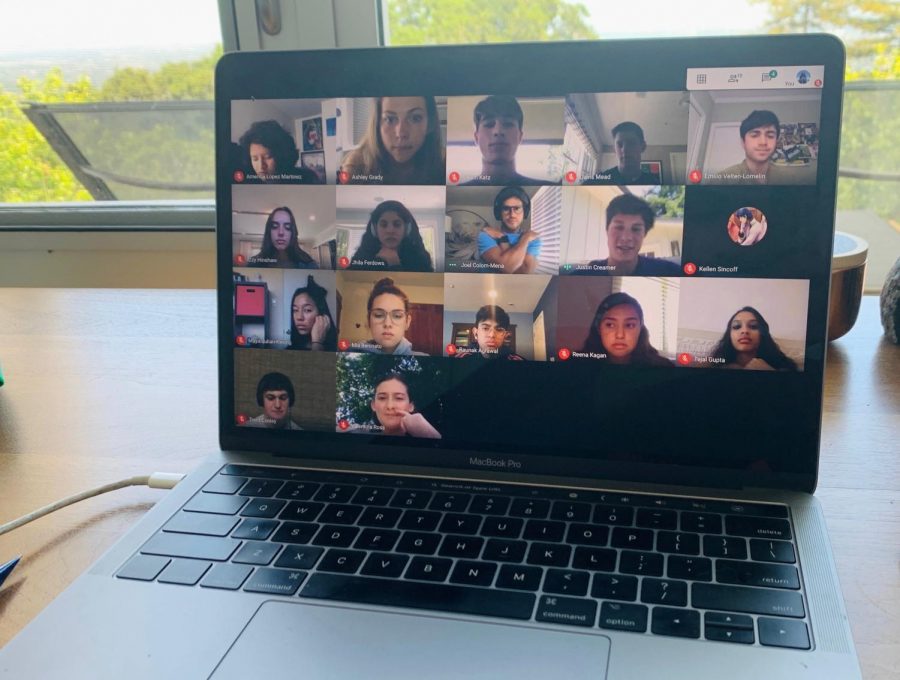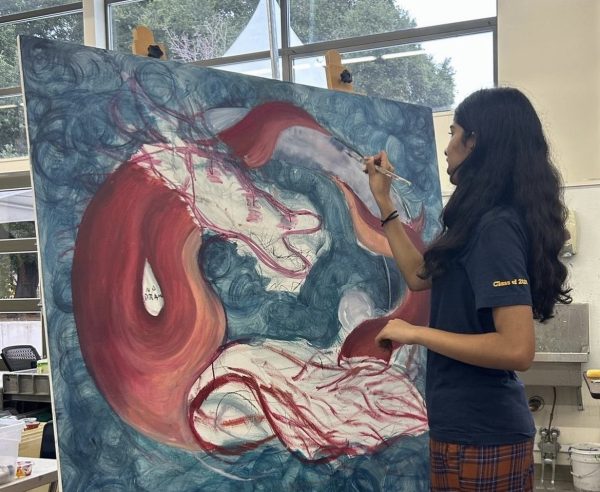Exploring the Impact of Online Learning on Student Participation
An intermediate Spanish class participating in a class discussion over Google Meet. Photo courtesy of Uma Misha.
April 28, 2020
Over the last five weeks, students have been adapting to the new online form of learning Menlo has implemented. While the schedule has changed in several ways, such as the length of class periods and the amount of assigned work, students’ participation and learning behaviors have also shifted with the switch to online learning.
Sophomore Uma Misha, junior Lindsey Ball and senior Sam Forese, all moderately vocal students, say that they notice themselves participating far less than they did earlier in the school year. “It feels like a bigger ordeal to participate in the online classrooms,” Misha said, adding that in classes where she participates more such as English and History, she is doing worse.
Ball points out how the natural rhythm of a class discussion is lost in the online setting: “there’s not really a natural time to interject, and there’s not a method to raising your hand, so getting called on is hard.” Ball characterizes herself as a student who participates often, and she feels that she’s losing a lot of that learning experience with online classes.
Forese highlights his experience in online classrooms and contributes his decrease in participation to being confused more often in class. “It’s a bit harder to retain the information, so I spend more of my attention on making sure I know what’s going on and less on adding to the discussion.”
On the other hand, freshman Ralston Raphael and sophomore Zoe Gregory have seen online learning as a way to participate more in their classes. For Raphael, the lighter workload has provided a learning environment where he feels confident to speak in front of the class. However, he notices that his classmates aren’t taking the same opportunity, and instead are disengaging and going on their phones during class.
Gregory, who describes herself as a quieter student, says that while she doesn’t often talk in class, online learning has provided new opportunities for participation like online discussions and discussion boards. Gregory also notices she’s communicating more with her teachers via email. “I’m definitely forced to ask more questions because, for me, it’s harder to understand stuff in class,” Gregory said.
While participation in class varies, all of the students agree that they meet dramatically less with their teachers one-on-one. While Raphael contributes this to class being more manageable, Ball argues that there is less of a push to reach out to teachers. “While I used to meet with teachers even when I had the concepts down, I now only meet with them if I am seriously lost in the material.”
So what can Menlo do? Ball suggests that creating a system of check-ins where students and their teachers meet one-on-one is a viable way to make sure that the class is staying on track. Additionally, before the spirit week that started on Monday April 20, Raphael noticed a lack of school spirit and participation in non-academic settings and proposes that Menlo implement online spirt activities like gaming tournaments.
While students have ideas on what Menlo can go, Head of School Than Healy assures that teachers are working hard to help students through this transition and that this new system is continually adapting. “We’ve got 105 years of experience as an in-person, relationship-based educational environment and five weeks of experience as an online school,” Healy said. “Our teachers are knocking themselves out […] to find ways to connect with their students.”














Zadie Winthrop • Aug 5, 2020 at 12:40 am
Very interesting article! I have seen this at my school too.
Thanks,
Zadie
Keith Larsen • May 6, 2020 at 9:06 pm
Sammie; Very nice article. Ralston is a basketball player of mine. Good to hear he is doing well in the classroom
Well Done
Coach Keith